Top Skills Employers Look For in 2022 [200 Recruiters Survey]
Create Your Resume Now
What skills do employers look for in candidates? It’s the ultimate question for many job seekers and poses a real challenge both when writing your resume and during the recruitment process. After all, what skill set is most important when choosing a candidate? How do employers verify your skills, and do they actually read that carefully curated skills list on your resume?
We’ve set out to answer all those questions and more by getting an insight into the minds of recruiters and the skills they’re looking for in candidates. We surveyed more than 200 recruiters and hiring managers to discover which skills they value and how they verify if candidates actually have them.
So sit back, and get ready to find out if your own skills measure up.
What Job Skills Are Most Important?
Let’s start with the big one. Which skill set is most important to employers when choosing a candidate. Soft skills or hard skills?
But before you get the answer, a brief explanation. Soft skills are a broad set of transferable skills that are mainly related to the way you work with other people. They include social skills, communication skills, emotional skills, and people skills. They’re also tough to teach and difficult to measure.
Hard skills by contrast are easy to teach and measure. They consist of abilities that are often job specific and can be more easily obtained through formal education and training. A few examples include technical skills, computer skills and language skills.
And the winner? Soft skills were the clear favourite, with a full 61% of respondents considering them of paramount importance over hard skills.
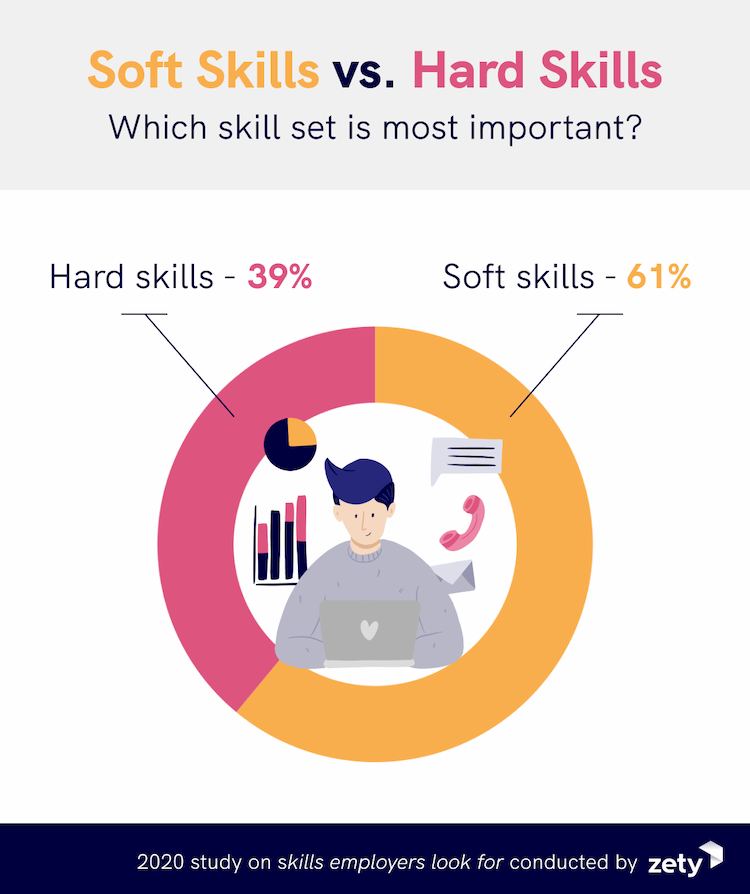
This makes perfect sense. Working with others is a crucial part of virtually every job in every industry. Whether it’s colleagues or customers, it’s essential to be able to effectively navigate the complexities of human interaction.
Our findings are backed up by other studies too. LinkedIn’s 2019 Global Talent Trends report found an even bigger preference for soft skills. 92% of hiring managers surveyed said that soft skills are as important, or more important, than hard skills.
And a study published in the International Journal of Applied Management and Technology revealed soft skills to be of “paramount importance” for the global work environment. So though these skills are considered soft, you’ll have a hard time succeeding in the workplace without them.
Now let’s dig a little deeper.
Top 10 Most Important Soft Skills in a Candidate
We gave our respondents a list of soft skills and asked them which they considered to be most important in a candidate/potential employee. They could select up to five choices. These results reflect the ten most important skills as chosen by our respondents.
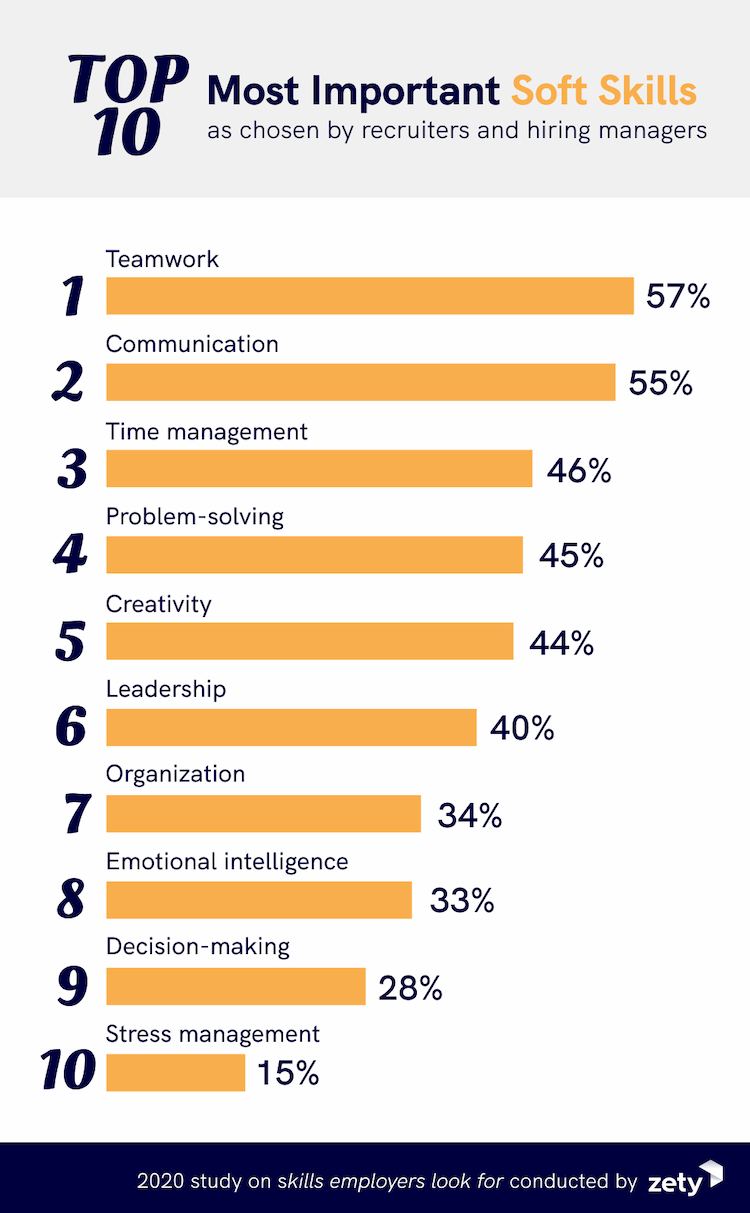
No surprises here, teamwork tops the list followed closely by communication skills. In both cases, more than half of our respondents considered these to be important soft skills. To deliver the very best results for your employer you have to work effectively with your colleagues. And whether it’s between colleagues, or with clients, you have to be able to communicate effectively too.
Interestingly, though they’re in high demand, these soft skills were also cited as being among those most often missing from candidates’ resumes. As one respondent answered when asked which skill or quality is most often missing:
The ability to work well with others. Hard to predict personality conflicts.
And another:
Intra work communication skills between employees.
And another simply said:
Teamwork or work on team projects.
In fact, the majority of skills cited as being missing from candidates’ resumes were indeed soft skills. We asked our respondents which skills were most often missing from candidates’ resumes. They could give an open response and no suggested options were provided. And the three most common answers were communication skills, being a team player and leadership skills. Most of the other answers mentioned soft skills too.
Once again, our findings are backed by other recent research, a comprehensive analysis of soft skills carried out by Professor Adrienne Royo of Southern Adventist University found that communication skills took the top spot with teamwork coming in at number three. And the number two spot on the review? It was time management, which came in at number three on our survey.
And you just might want to change your emphasis on soft skills depending on the gender of the recruiter. We spotted notable differences in the way men and women view communication and decision-making.
Almost 60% of male respondents viewed communication as important compared to around 47% of women. But with decision-making it was women who regarded it as more important, 36% compared to around 22% of men.
But regardless of gender, there’s no doubt that working on improving your soft skills and better highlighting them on your resume will pay dividends when you’re looking for work. Hiring managers and recruiters just love them, and feel they’re in short supply.
It's worth pointing out that many of these skills are especially important considering the huge increase we've seen in remote working. Communication becomes even more essential when you can't see colleagues face to face. Time management and organization become even more critical in the face of distractions at home. Not to mention the need for creativity and leadership to solve challenges and maintain a motivated workforce.
As one respondent pointed out regarding this:
COVID has made dependable, resilient, flexible, & patient employees absolutely critical.
But soft skills aren’t the be all and end all when it comes to fighting your way through the recruitment jungle. Hard skills play a valuable role too, and that’s what we’ll examine next.
Top 10 Most Important Hard Skills in a Candidate
As with soft skills, we gave our respondents a list of hard skills and asked them which they considered to be most important. Again, they could select up to five choices and these results reflect the top ten most important hard skills as selected by our respondents.
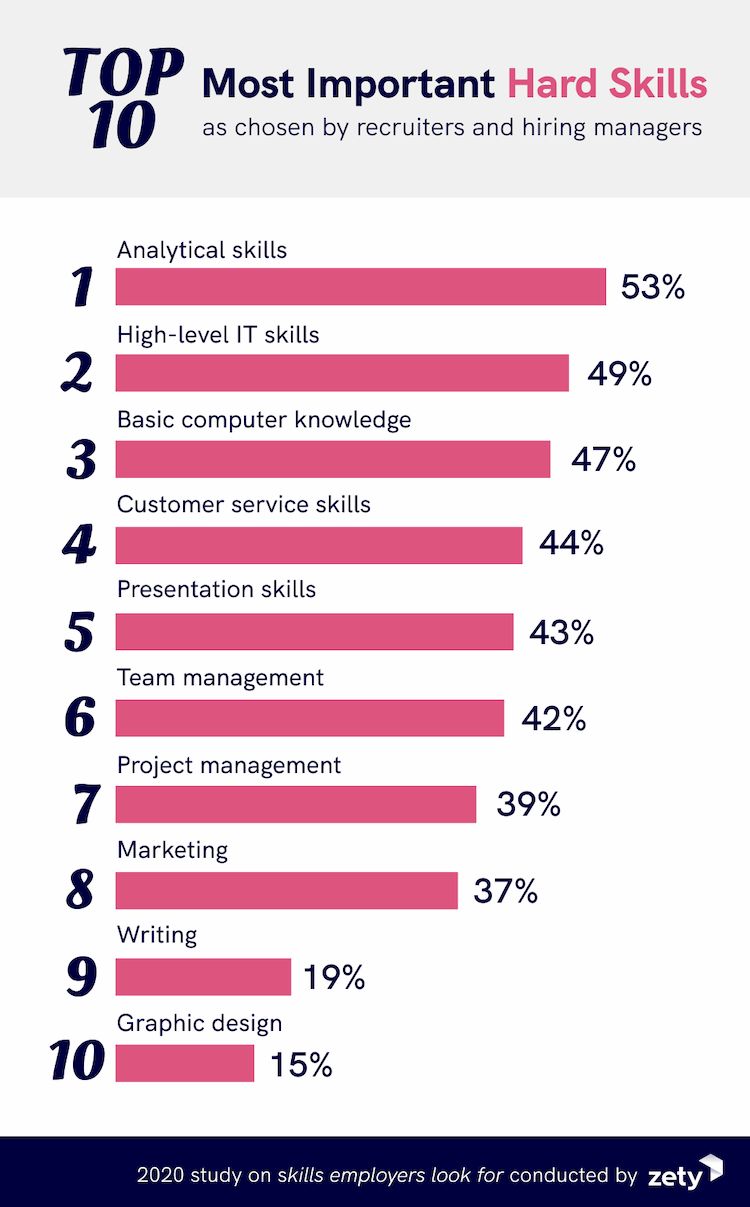
Taking a look at the top skills there it seems obvious that the modern workplace is definitely data and tech driven. At the top of the list, more than half of our respondents considered analytical skills to be among the most important hard skills for a potential employee.
Again, this makes sense. A big part of analytical skills involves developing insights from data, and the data economy is worth billions in the U.S. alone. Everyone wants a slice of that very lucrative pie.
High-level IT skills and basic computer knowledge take up second and third place. It goes without saying that we live in an ever more digitized world, and the advent of widespread remote working has made basic computer skills even more essential to be able to function in the workplace. As one respondent put it:
Because of COVID-19, I always seek a computer-literate candidate.
Technophobes take note. Now more than ever you need to make sure your tech skills are up to speed.
But don’t just take our word for it, this is backed up by some of the top sources in the recruitment business. LinkedIn compiled a list of the most in-demand skills for 2020. Of those a full seven out of 10 of the most in-demand hard skills were related to analytics and computers/IT.
And just as with soft skills, we noted a split based on gender. Two notable examples were analytical skills and customer service skills.
Almost 60% of male respondents rated analytical skills as important compared to just over 44% of women. In the case of customer service skills the gender difference was flipped with 57% of women considering them important compared to around 34% of men.
Are you curious about which skills people add to their resumes most often? Our detailed analysis of 11 million resumes created in our builder has shown that these are the top 10 most frequently added skills overall:
- Teamwork and Collaboration
- Problem-solving
- Excellent Communication
- Multitasking
- Attention to Detail
- MS Office
- Analytical and Critical Thinking
- Data Entry
- Project Management
- Team Management
So now that you know what skills hiring managers and recruiters are looking for, let’s take a look at how they determine if you’ve actually got what they want.
Hired or Fired? How Hiring Managers Verify Your Skills
It’s become trendy in some circles to claim that resumes are no longer relevant, but to paraphrase Mark Twain, reports of the resume’s death have been greatly exaggerated.
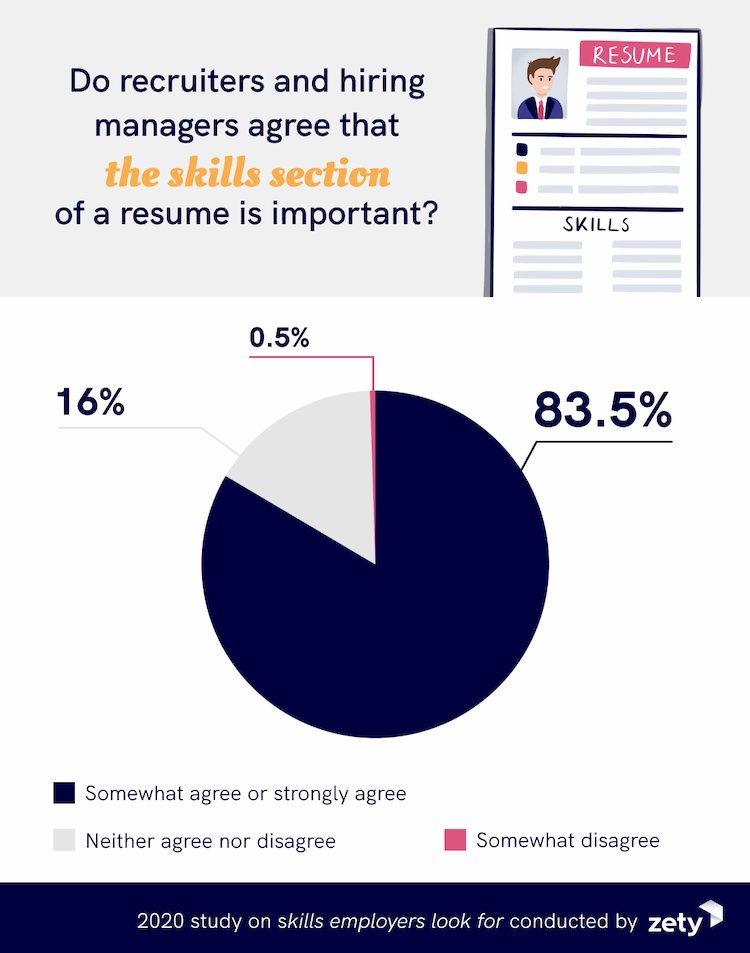
As you can see, the vast majority of recruiters and hiring managers we surveyed agreed that the resume skills section is important to at least some extent, with more than half strongly agreeing. So getting your skills right on your resume is key.
But whatever you do, don’t blindly copy the most sought after hard and soft skills we’ve just mentioned. Hiring managers don’t want to just see a skills list, they want to see skills that are tailored to the role they’re recruiting for.
To write a well-targeted skills list take a look at the job ad and make a note of the skills that are listed. Then be sure to include any of your own skills that match the job requirements, along with any transferable skills that are applicable to that particular role. But be truthful.
Decision-makers start with your resume of course, but when it comes to making a final choice they need to dig even deeper. That’s where the dreaded job interview comes in, and that’s where you get subjected to even closer scrutiny.
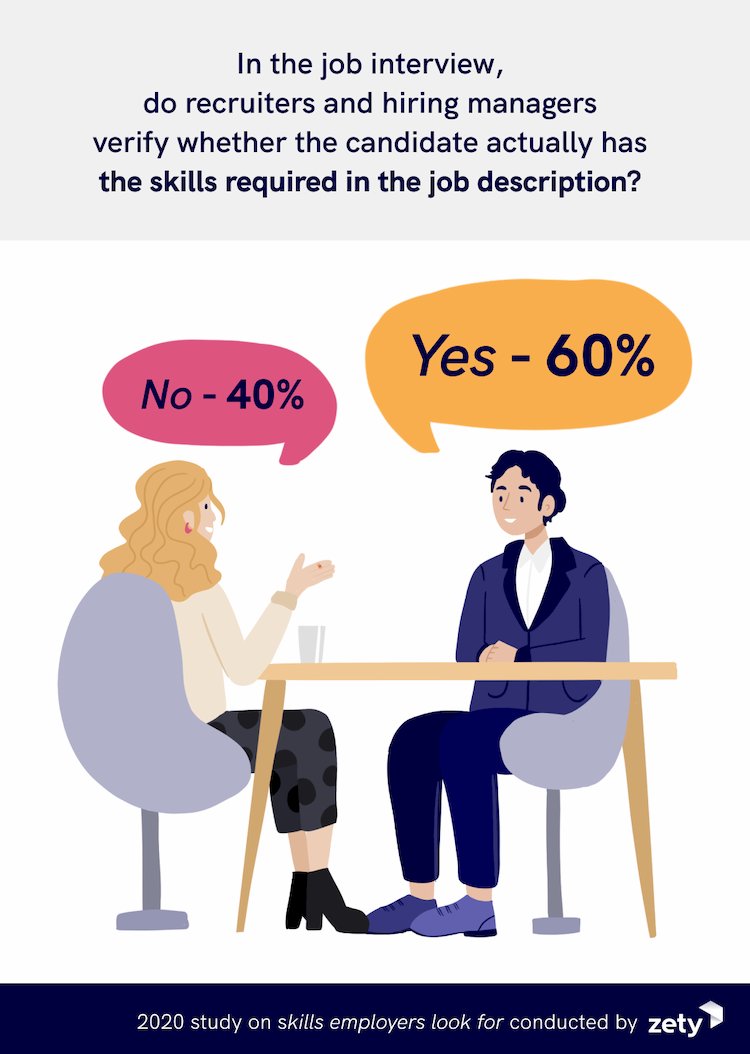
Yes, at the interview stage the majority of recruiters and hiring managers do verify if you really possess all the skills required in the job description. And yes, 40% don’t verify, but do you really want to take the chance?
I don’t like those odds, and even if you do get away with it in the interview you’ll most likely be found out later. In fact, another study revealed that 75% of employers have caught out lies in recruitment. That’s why we recommend you should never lie on a resume.
So just what techniques do employers use to verify your skills? The most popular method reported was simply asking probing questions about skills and abilities and assessing the candidate’s response. Testing was a popular method too, as was verifying claims with previous employers. So yes, references on your resume do get checked.
Here are a couple of actual answers from respondents to give some more insight.
I ask candidates to evaluate their overall performance in their last job. Specifically, to rate their performance as low, medium or high and to explain why. I'm looking for honesty and a good ability to self-reflect here. I also generally ask candidates to explain some of the qualities that made their colleagues and peers in their last job standout performers, and what, if anything, they took away from that. I'm looking to understand what kind of abilities they think are important to succeed in a job. We also use personality assessments to gauge candidates' preferences for work environments and colleagues.
I use pre-employment tests. I use a skills test at the very beginning of the application process. In this way, all candidates who do not know how to do the actual job are discarded at the very start.
So prepare yourself before you attend the interview so you’re ready for that skills-based interrogation. Go over your resume and make a note of all the skills you’ve mentioned. Then think back over your work history and come up with examples of times you’ve practically applied those skills. Particularly, examples of when you’ve achieved something as a result. An improvement, a cost saving, an increased profit or other key metric.
Think of it this way. It’s not about just saying what you did, but proving how well you did it. So also back up your achievements with numbers to quantify them. And make sure you prepare and practise answers for your interview using the tried and tested STAR technique. Do this and you’ll be more than ready to settle any doubts the interviewer might have.
Conclusion
When it comes to the most important skills employers look for our findings back up previous research. Soft skills are paramount and when it comes to hard skills the most desirable abilities are analytical skills and Computer/IT skills.
If you want success in your current job, and when applying for a new one it’s essential that you maximize your knowledge in these areas. In the case of both soft skills and hard skills seek out formal training to learn more, but don’t stop there. You need to apply your knowledge in the workplace, practising those skills and gaining real experience and accomplishments through their use.
When it comes to a job interview you will be asked to verify the skills you claim to possess. And the best way of doing that is being able to cite real examples of what you’ve achieved with your claimed skill set. So don’t prepare to fail by failing to prepare. Before you attend an interview make sure you memorize examples of your work that are solid evidence of your skills.
As one respondent explained:
Most candidates say they have analytical skills, but haven't effectively shown how they have used or applied those skills.
So upgrade your skills, meticulously prepare for job interviews, and you’ll boost your employability and your credibility with recruiters and hiring managers.
Methodology
The findings presented were obtained by surveying 205 U.S. recruiters and/or hiring managers. Respondents were asked questions relating to what skills they value in candidates and how they verify them. These included yes/no questions, scale-based questions relating to levels of agreement with a statement, questions that permitted the selection of multiple options from a list of potential answers, and questions that permitted open responses.
Sources
- "The 5 Most Important Job Skills For The Future"
- Cimatti, Barbara., Definition, Development, Assessment of Soft Skills and Their Role for the Quality of Organizations and Enterprises
- Dean, Susan A. & East, Julia I., “Soft Skills Needed for the 21st-Century Workforce”
- Hendarman, Achmad F., Tjakraatmadja, Hidarjat J., “Relationship among Soft Skills, Hard Skills, and Innovativeness of Knowledge Workers in the Knowledge Economy Era”
- Mann, Charles R., “A Study of Engineering Education”
- Meeks, Gloria A., “Critical Soft Skills to Achieve Success in the Workplace”
- Robles, Marcel M., “Executive Perceptions of the Top 10 Soft Skills Needed in Today’s Workplace”
- Royo, Adrienne J., "Soft Skills that Employers are Seeking"
- Singh, Jaswant P., “A Study of the Soft Skills that Contribute to the Success of Newly Graduated Business Students in the Workplace”
- Van Nuys, Amanda., “New LinkedIn Research: Upskill Your Employees with the Skills Companies Need Most in 2020”
- “Data Economy: Radical transformation or dystopia?”
- “Employers Share Their Most Outrageous Resume Mistakes and Instant Deal Breakers in a New CareerBuilder Study”
- “S.T.A.R. Method for Behavioral Interviewing”
- “Soft Skills in the Workplace: Essential Skills Toolkit”
Fair Use Statement
Want to share our content? We’d love you to. All we ask is that you take the chance to practise your IT skills and link back here, giving our authors full credit.
About Us
Zety offers more than just an online resume builder. It also shows job seekers how to make a resume from scratch, which skills should appear on a resume and the difference between soft and hard skills.
About Zety’s Editorial Process
This article has been reviewed by our editorial team to make sure it follows Zety's editorial guidelines. We’re committed to sharing our expertise and giving you trustworthy career advice tailored to your needs. High-quality content is what brings over 40 million readers to our site every year. But we don't stop there. Our team conducts original research to understand the job market better, and we pride ourselves on being quoted by top universities and prime media outlets from around the world.
